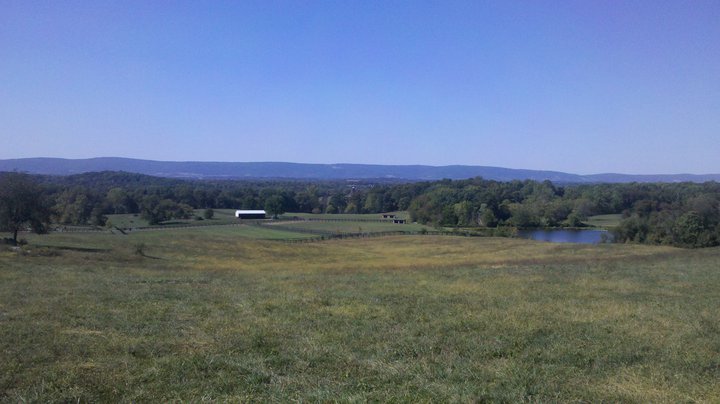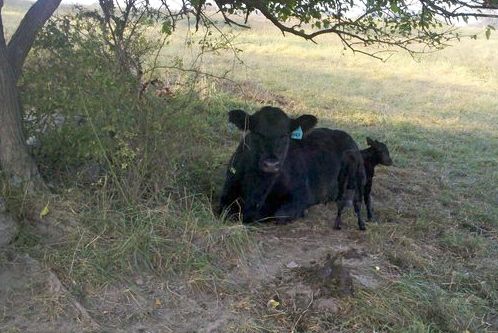The Facebook Generation Tunes In to Conservation, Land Management
By: Amos S. Eno
Posted on:11/08/2010 Updated:08/29/2012Locust Hill Farm in Fauquier County, Virginia is a Study in Youthful Stewardship and Wired Technology
In just about three years time, with no formal agricultural training, Michael Webert has developed a comprehensive vision and management regime for Maggie Bryant’s 1000-acre farm. In doing so, he is bringing great credit to his grandmother, who pioneered the use of conservation easements in her corner of Virginia.
Forty-five years ago, Maggie and her husband, Herbert Bryant, were among the very first people in the region to permanently prohibit development of their land through a conservation easement. Due to the leadership of people like them, Fauquier County (“pronounce it carefully!” Maggie says) has one of the highest percentages of conservation easements in the country.
All in the Family
Michael is Maggie’s oldest daughter’s son. In 2003, Michael came to Locust Hill and “began puttering around,” Maggie says, “then started working and took over. He has created a first class management regime for the farm, including fencing riparian areas and restoring grasses. I am so lucky.”
Michael, who is 31, didn’t grow up on a farm but as a teenager worked bucking hay during the summer. His first initiative at Locust Hill was the creation of an “earn-a-buck” program. The rules were take two does before you take a buck; take only bucks with a 120-inch rack or larger; and earn hunting rights by providing 40 hours of farm labor each season.
Cattle, Hay, Horses and the Internet
Michael’s interests soon expanded from hunting to the haying and cattle operations. When he first began as general manager in 2007, Locust Hill had “19 head of cattle, poorly managed. I studied it a little online and decided to get  into the seed stock business, producing sires and dams for commercial cattlemen.”
into the seed stock business, producing sires and dams for commercial cattlemen.”
Artificial insemination and the internet makes it easy for Michael to choose from literally thousands of crosses for his cows. He selects and tests only the top 5% of calves born on his farm to be sold as breeders. His goal is to produce a good all-around animal that will gain an average of 2.5 pounds per day or higher. Locust Hill produces Black Angus, Hereford, and crosses of the two, known as “black baldies.”
As for the hay, “I had good mentors,” says Michael. “The farm manager next door was at one point a competitor, but a friendly competitor and we’ve become quite good friends.” Michael’s hay also feeds his grandmother’s chief interest at Locust Hill, its horses. Maggie, a respected steeplechase horse breeder, has won the Golden Horse twice, which is an annual award for the number one steeplechase owner in France.
Michael’s task in managing the pastures has been to pump value back into the ground. “I’m of the mind that if you take, you’d better put back, otherwise you’re not going to be able to take very long. If I have a pasture that’s really poor, the best way to get rid of the weeds is put it through a crop rotation: two years of corn, one year of soy, with cover crops of rye in the winter. At the end of those three years I’ll have a pasture that’s weed free, with the flexibility to plant it with any variety of grasses that I want.”
A Virginia state program that promotes best management practices has helped Mike turn 250 neglected acres into a 5-pasture grazing unit, with water development, and more than 10,000 feet of new fencing, to protect streams and allow more careful grazing rotation. As the success of his cattle operation has grown, he’s taken on similar projects nearby.
Why Did This Young Man Choose to Work on the Land?
“If not for people like my grandmother, I’d be living in a housing development right now. This area of Virginia is continuously growing even with the poor economy. I have no doubt that in my lifetime, this will become the only green stamp in this area.”
Michael tells me he’s motivated most by his love of the land. “That’s really the only reason I’m out here,” he says, “treating the land with respect. I love it when people say ‘you grow the best hay in the region.’ I love it when they say ‘Locust Hill is one of the most progressive Angus breeders in the country.’
“I want to use technology, training, and my knowledge to make the land productive, not only for us but for the land itself. We’re in one of my favorite times right now, fall calving season. When you see a new baby calf lying in the grass, well, there’s nothing like it. I use my cell phone to snap pictures and send them to our Facebook page all the time.”
use technology, training, and my knowledge to make the land productive, not only for us but for the land itself. We’re in one of my favorite times right now, fall calving season. When you see a new baby calf lying in the grass, well, there’s nothing like it. I use my cell phone to snap pictures and send them to our Facebook page all the time.”
Michael Webert is one face of our country’s youthful “back to the land movement.” Many of the nation’s newest farmers do not come from farming families, but are pioneering integrated, intensive, organic, and even inner city farming. The common thread is good stewardship. If Michael is any indication, these young people will grow into the kind of leaders that America sorely needs.
Feedback
re: The Facebook Generation Tunes In to Conservation, Land ManagementBy: Debra Carpenter on: 12/10/2010Now THAT is a good story. We certainly need more forward-thinking, innovative young farmers in the agricultural industry. A big thank you to this family and their stewardship.
 Sign In
Sign In
 Sign In
Sign In
